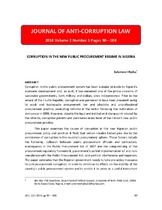| dc.contributor.author | Ifejika, Solomon I | |
| dc.date.accessioned | 2022-02-08T07:30:01Z | |
| dc.date.available | 2022-02-08T07:30:01Z | |
| dc.date.issued | 2018 | |
| dc.identifier.citation | Ifejika, S. (2018). Corruption in the new public procurement regime in Nigeria. Journal of Anti-Corruption Law, 2(1). 90-108 | en_US |
| dc.identifier.uri | http://www.jacl.org.za/images/stories/vol_2_corruption_in_the_new_public.pdf | |
| dc.identifier.uri | http://hdl.handle.net/10566/7198 | |
| dc.description.abstract | Corruption in the public procurement system has been a major obstacle to Nigeria’s
economic development and, as such, it has remained one of the prime concerns of
successive governments, both military and civilian, since independence. Prior to the
advent of the Fourth Republic, corruption was perceived to have been prevalent owing
to weak and inadequate procurement law and obsolete and unprofessional
procurement practice, prompting reforms in the sector following the restoration of
democracy in 1999. However, despite the legal and institutional changes introduced by
the reforms, corruption persists and permeates every facet of the nation’s new public
procurement practice.
This paper examines the causes of corruption in the new Nigerian public
procurement policy and practice. It finds that certain notable factors give rise to the
persistence of corruption in the country’s procurement sphere. These factors include
the following: collusion between public procurement officials and contractors;
inadequacies in the Public Procurement Act of 2007 and the compromising of the
procurement regulatory framework; government’s partial implementation of and
noncompliance with the Public Procurement Act; and political interference and nepotism.
The paper concludes that the Nigerian government needs to take pro-active measures
to curb procurement corruption, in order to minimise its effects on the viability of the
country’s public procurement system and to enable it to serve as a useful instrument for
achieving long-desired social and economic development goals. Some
recommendations in this regard are offered.
The paper adopts documentary methods of data collection and analysis. These
methods were found to be appropriate for interrogating the subject matter of the
discourse and achieving the objective of the study. | en_US |
| dc.language.iso | en | en_US |
| dc.publisher | University of the Western Cape | en_US |
| dc.subject | Nigeria | en_US |
| dc.subject | Public procurement | en_US |
| dc.subject | Economic development | en_US |
| dc.subject | Corruption | en_US |
| dc.subject | Nepotism | en_US |
| dc.title | Corruption in the new public procurement regime in Nigeria | en_US |
| dc.type | Article | en_US |

